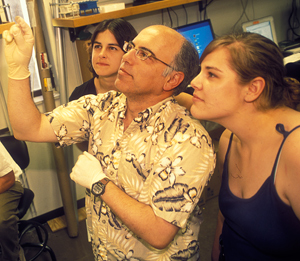The University of California, Santa Cruz, has been selected to be one of 12 inaugural members of the Science Education Alliance (SEA), a new program developed and funded by the Howard Hughes Medical Institute (HHMI) that aims to enhance the teaching of science and inspire new generations of researchers.
The SEA program will expand the number of undergraduate college students exposed to investigative research. Beginning in the fall of 2008, UCSC and 11 other participating institutions will offer undergraduates an innovative course in phage genomics that involves conducting experiments in the field and the laboratory. Students in the course will also join the national SEA research network, allowing them to share data and collaborate with each other, much as professional research scientists do.
"This will give students a chance to get hands-on experience connecting them to the process of discovery, and to go beyond just learning factoids from books," said Manuel Ares, professor of molecular, cell and developmental biology at UCSC. Ares will be trained by HHMI to teach the course, along with Grant Hartzog, associate professor of MCD biology.
The Phage Genomics course offered by the 12 SEA member schools will be modeled after a pilot project that was developed and taught this year by Graham F. Hatfull, an HHMI professor at the University of Pittsburgh. Students go out into the field, collect microbes, and then isolate bacteriophages--viruses that infect bacteria. In the lab, each student studies one phage that he or she finds, isolates its DNA, clones it, and then sequences its genome. When the SEA network is established this fall, students will be able to compare their own phage's genome with others being studied.
The program will offer undergraduates a rare opportunity, early in their studies, to contribute to real scientific discoveries. Although phages are plentiful and easy to study, little is known about their diversity in the wild. The UCSC students will be encouraged to explore and sample a wide variety of microenvironments, such as canopies of redwoods, mountain caves, and tide pools of the Pacific Ocean. Every student will likely find and name a new phage species previously unknown to science, Ares said. Students will also have their data reviewed by peers, and their findings may be published in professional journals.
Ares and Hartzog plan to offer "Phage Genomics" as a 2-unit course that must be taken every quarter in the fall, winter, and spring. Only 15 to 20 students will be selected to participate. Freshmen with AP credit in biology will be encouraged to apply, according to Ares. The course will satisfy university requirements for laboratory science, but will offer more than just lab techniques.
"Students who have run gels and columns and have sequenced DNA will gain a sense of the art of interpretation of data," said Hartzog. "It's something special that students will get out of this course."
According to Ares, the new SEA program will benefit not only UCSC students, but also faculty. If assessments show that the new course has broad impact on students' success, as he expects, the SEA program could help kindle a revolution in teaching, he said.
Faculty should find it energizing to work with top-notch students and rewarding to help undergraduates stay engaged in science, Ares said. Eventually, he envisions involving professors from multiple departments, such as environmental toxicology and chemistry.
"I'm hoping that this course will be instituted as a permanent part of our curriculum and that different faculty will be rotated through it," said Ares. "Then faculty will be reinvigorated and will bring new excitement to their teaching."
Ares has been involved in other HHMI efforts to improve undergraduate science education. As an HHMI professor, he received a $1 million grant that enabled him to run a special undergraduate research lab for four years. (See earlier stories about the grant and the achievements of students in the Ares lab.)
HHMI is offering three years of support to all SEA institutions. The funding will cover expenses for the training of faculty, course materials, laboratory reagents, computing and software support, and an Internet-based networking infrastructure.
A news announcement from HHMI about the SEA program, including a list of all the participating institutions, can be viewed on the HHMI web site.
Note to reporters: You may contact Manuel Ares at (831) 459-4628 or ares@biology.ucsc.edu. Grant Hartzog can be reached at (831) 459-5826 or hartzog@biology.ucsc.edu.



